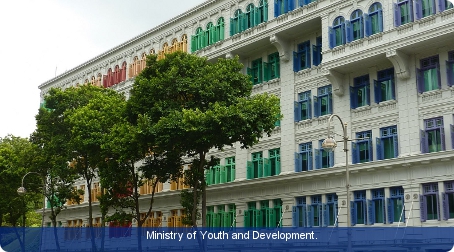Government
- Overview
- History

Singapore is a republic and parliamentary democracy with a non-executive president. The constitution of 1959 provides for a head of state, a prime minister, a cabinet and a unicameral parliament.
Singapore’s first four presidents were elected by parliament; the first presidential elections by popular vote were held in 1993. Since 1993, presidents are elected for a six year term. The position is largely ceremonial. The president appoints the prime minister, who is generally the leader of the largest party or coalition in parliament. The president also appoints the cabinet, though it is the prime minister who carries out the selection process from the members of parliament. Executive power is vested in the prime minister and cabinet.
Parliament is made up of three types of members: 87 elected members, up to nine nominated members (NMPs) and up to three non-constituency members (NCMPs) from the opposition political parties. In early 2011 the Eleventh Parliament had 94 members, comprising 84 elected members, nine NMPs and one NCMP. Members are elected for five year terms.
Suffrage is compulsory and universal for those over the age of 21.
The constitution provides for the independence of the judiciary. The Supreme Court comprises the High Court and the Court of Appeal. Other courts include the district courts, magistrates’ courts, Coroner’s Court, Juvenile Court and Family Court. The Court of Appeal is the final court of appeal. The High Court has original jurisdiction in the most serious civil and criminal cases and appellate jurisdiction in appeals from the lower courts. The district and magistrates’ courts both have jurisdiction in civil and criminal matters, the more serious cases coming before the district courts.

The name ‘Singapore’ derives from the Sanskrit Singa Pura (‘City of the Lion’). To the Javanese in the fourteenth century, it was once known as Tamesk (‘Sea Town’).
With the permission of the island’s two rulers, the Sultan of Johor and the Temenggong (the Malay ruler of the island), Singapore became a British trading colony in 1819. In the early 1920s the British began to construct a great naval base on the Johor Straits. The Japanese occupied Singapore between 1942 and 1945; in 1946, separated from the Strait Settlements, Singapore became a British colony with a provisional advisory council. In 1959, with Lee Kuan Yew as the first prime minister, Singapore became a state with its own citizenship and complete internal self-government.
In 1963 Singapore was incorporated into the Malaysian Federation but two years later it became independent as a separate state.
The People’s Action Party (PAP), led by Lee Kuan Yew, was first elected in 1959 and was continuously in power for the rest of the century. In 1965 Yusof bin Ishak became Singapore’s first president.
In 1990 Lee Kuan Yew was succeeded by his former deputy Goh Chok Tong as prime minister. In 1993 Ong Teng won Singapore’s first presidential election.
In the first decade of the twenty-first century the PAP continued to dominate parliament. In the May 2006 general election the PAP won 82 seats and 66.6% of the votes. Opposition parties contested 47 seats, and it was the first time that more than half the seats were contested. In the May 2011 general election the PAP won 81 seats and 60.1% of the vote.
In 1999 and in 2005 the election committee, under the very restrictive eligibility rules, found only one presidential candidate to be eligible. There were thus no presidential elections in those two years. In a hard-fought presidential contest in 2011, former deputy prime minister Tony Tan – with 35.2% of the votes cast – defeated his three rivals.



